新编英语语法教程
章振邦《新编英语语法教程》教学大纲
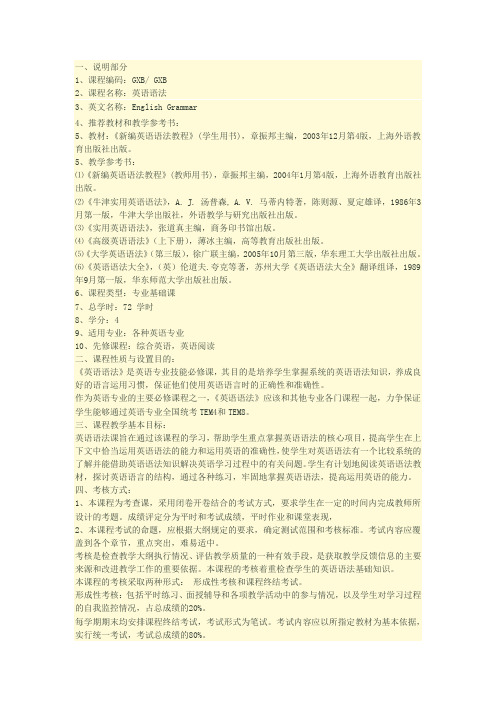
1、课程编码:GXB/ GXB2、课程名称:英语语法3、英文名称:English Grammar4、推荐教材和教学参考书:5、教材:《新编英语语法教程》(学生用书),章振邦主编,2003年12月第4版,上海外语教育出版社出版。
5、教学参考书:⑴《新编英语语法教程》(教师用书),章振邦主编,2004年1月第4版,上海外语教育出版社出版。
⑵《牛津实用英语语法》,A. J. 汤普森, A. V. 马蒂内特著,陈则源、夏定雄译,1986年3月第一版,牛津大学出版社,外语教学与研究出版社出版。
⑶《实用英语语法》,张道真主编,商务印书馆出版。
⑷《高级英语语法》(上下册),薄冰主编,高等教育出版社出版。
⑸《大学英语语法》(第三版),徐广联主编,2005年10月第三版,华东理工大学出版社出版。
⑹《英语语法大全》,(英)伦道夫.夸克等著,苏州大学《英语语法大全》翻译组译,1989年9月第一版,华东师范大学出版社出版。
6、课程类型:专业基础课7、总学时:72 学时8、学分:49、适用专业:各种英语专业10、先修课程:综合英语,英语阅读二、课程性质与设置目的:《英语语法》是英语专业技能必修课,其目的是培养学生掌握系统的英语语法知识,养成良好的语言运用习惯,保证他们使用英语语言时的正确性和准确性。
作为英语专业的主要必修课程之一,《英语语法》应该和其他专业各门课程一起,力争保证学生能够通过英语专业全国统考TEM4和TEM8。
三、课程教学基本目标:英语语法课旨在通过该课程的学习,帮助学生重点掌握英语语法的核心项目,提高学生在上下文中恰当运用英语语法的能力和运用英语的准确性,使学生对英语语法有一个比较系统的了解并能借助英语语法知识解决英语学习过程中的有关问题。
学生有计划地阅读英语语法教材,探讨英语语言的结构,通过各种练习,牢固地掌握英语语法,提高运用英语的能力。
四、考核方式:1、本课程为考查课,采用闭卷开卷结合的考试方式,要求学生在一定的时间内完成教师所设计的考题。
外教社新编英语语法教程(第6版)PPT课件Unit 26

重难点解析
26.2 比较结构
26.3 关于比较结构 用法的补充说明
(3)基本用法三:两个不同主语就不同方面进行比较。 即主语不同,比较项目也不同。
e.g. One is as light as the other is heavy. ——两个物体就轻重作比较。 (一个轻,而另一个重。)
It was by far the worst speech he had ever made. That was much the best meal I have ever tasted.
提示 注 意 very 和 much 修 饰 最 高 级 时 , 位 置 稍 有 不 同 。 如 “They wanted the very best quality.”。
An oxygen atom is about 16 times heavier than a hydrogen atom. (氧原子重量大约是氢原子重量的16倍。/ 氧原子比氢 原子大约重15倍。)
Its profits are rising four times faster than the average company. (其利润正以一般公司4倍的速度快速增长。)
重难点解析
26.2 比较结构
26.3 关于比较结构 用法的补充说明
1 as … as结构
1. 基本模式: as + 形容词或副词原级 + as-分句 否定式: not as / so + 形容词或副词原级 + as-分句
(1)基本用法一:两个不同的主语就同一方面进行比较。 即主语不同,比较项目相同。
Of the two boys John behaves (the) more politely. Oxford is the older university of the two.
《新编英语语法教程》答案

《新编英语语法教程》答案《新编英语语法教程》答案新编英语语法教程第01讲Ex. 1A1. A. his home workB. quickly, to play2. A. The huge black horse B. the race3.A. have thought aboutB. going into space4. A. warms up and crawls B. out of the bag5. A. one of the most beautiful planets to look at through a telescope B. because of the many rings that surround it6. A. 165 years B. to complete its path, or orbit, around the sun7. A. you and your brother B. How many pairs of shorts8. A. the most expensive meal listedo n the menu B. What9. A. an “Outdoor Code” B. their members10. A. can blow B. as fast as 180 miles (290 kilometers) an hour11. A. The spiral of heated air and moist air B. to twist and grow and spin12. A. The direction a hurricane’s spiral moves B. counterclockwise13. A. does not shine B. At the north pole: for half of the year14. A. The cold winds that blow off of the Arctic Ocean B. a very cold place15.A. might have beenB. guilty of murderEx. 1B1. SVCWithin the stricken area, not a single soul remained alive, and the city centre looked as if it had been razed by monster steam-roller.2. SVThe bomb exploded 1,000 ft. above thegroun.3. SVOOn August 6, 1945, an American aircraft dropped a bomb on the Janpanese town of Hiroshima.4. SvoOThree days later, yet another bomb of the same kind gave the town of Nagasaki the same fatal blow.5. SVOCThe explosion made one and a half square miles of the city an expense of reddish rubble.6. SV AWithin the fraction of a second, the bomb changed from a metal cylinder into an immense mass of enpanding gas, millions of degrees hot.7. SVOAA tremendous blast of hot air whirled the debris of stone, cencrete, metal, and wood over the ground.Ex. 1C1.Walden Pond, once praised by Thoreau for its natural beauty, is now the site of many tourist stands.2. Almost every summer night the cooling northeast wind swept through our bedroom windows, marking air conditioning unnecessary and a light blanket welcome. / Swepping through our bedroom windows almost every summer night, the cooling northeast wind made…3. The steep surrounding slopes were capped with snow, which fed two streams plunging down to join in the valley below.4. With the river on one side and a large tree providing shade, this is a good spot for a picnic, and we can spread our blanket on the grassy knoll.5. Panting for breath after running up the stairs, Mr wood stood at hisneighbour’s door and knocked again and again till someone opened it.6. The town folk envied horace, who had come into a small fortune with which he bought a big house and obtained a partnership in the biggest grocery in town.7. Standing in front of the mirror, Jim looked at his image, wondering at the big change that had come over him in recent years.8. The idea that his only daughter whom he had greatly wronged might never forgive him almost drove hime mad.9. The story, written in plain language, consists of three parts with an interesting plot centering round an aristocratic family living in 17th century France.10.Mud-covered and shivering, John sat hunched over a bowl of hot broth prepared by his father to drive off the chill.11. Far above the waters of a beautiful lake and over the tops of the tall pime trees growing on the steep of a hill stand fiveChinese-style pavilions.12. Farther down the street, the old man stopped and leaned against a lamp-post, listening to a cheerful song coming out of a restaurant on the oppsite side of the street.13. Sarah sank in the nearest chair, completely exhausted, her limbs stiff with cold, her mind a piece of blank.14. Throughout the day Mrs Rymer behaved very properly, her pleasant, refined face wearing a grave look, herelegant figure wrapped in deep mourning while occasionally she uttered a sigh or a sob.15. Tony thought it necessary to break the news to his family, that Mr Jacob, his former employer, had promised him a half-day job at 20 pounds a week.16. The thought that he might have wronged his friend who had rendered him good services on many occasions troubled his mind, already overburdened with worries and cares.17. The men of the disbanded royal bodyguard, suddenly turned loose onto the street of a capital seething with unrest, unemployed and perhaps disgruntled at their abrupt dismissal, were a potentially dangerous element.18. For many years London has been a business centre with hotel accommadation for visiting businessmen toghter with well-to-do travellers but completely inadequate for the swarms of shour-stay tourists landing at Heathrow or disembarking at Dover.19. Nearing the top, he climbed recklessly faser and faster, his eyes already glowing with triumph, but suddenly he slipped and fell, tumbling to the ground and lying motionless there, a crumpled pile of arms and legs.20. Bertrand Russell was one of the very few persons who have received both the Order of Merit, which was conferred on him by the British government in 1949, and the Nobel Prize for literature, conferred in Norway in 1950.新编英语语法教程第02讲练习参考答案Ex. 2A1. come 2. are 3. has / have 4. are 5. are 6. are 7. was / were 8. is 9. costs 10. were 11. are 12. are 13. was 14. are 15. lie 16. were 17. are 18. is 19. is 20. was 21. Has 22. were 23. is 24. is 25. are 26. is 27. are28. cover, are 29. is / are 30. was/wereEx. 2B1. were 2. have 3. is, is 4. was 5. were 6. is 7. is 8. are 9. is 10. are, are11. have 12. are, their, their 13. was, It, was 14, It / They, is / are 15. are, their, they, disapprove 16. were, they 17. was 18. are 19. were 20. were新编英语语法教程第03讲练习参考答案Ex. 3A1. is 2. was 3. is 4. has 5. were 6. means 7. is 8. is 9. is 10. is 11. were 12. sells 13. is 14. are 15. are 16. are 17. is 18. is 19. was 20.provides21. are 22. was 23. stops 24. is 25. is 26. does 27. produces 28. is 29. is 30. wasEx. 3B 1. ’s2. are3. is4. are5. is6. was7. is8. were9. is 10. ’s 11. is 12. is, is, is 13. are 14. is 15. have 16. is 17. are 18. looks 19. are 20. are 21. understand 22. has 23. was 24. have 25. was 26. was 27. are 28. is 29. is 30. was 31. is 32.is / are 33. leaves 34. is / are 35. are 36. are 37. is38. comes 39. is 40. live 41. are 42. points / point 43. are 44. is 45. are 46. was 47. is / are 48. is 49. has 50. wasEx. 3C1. is / are 2. is / are 3. is 4. is / are 5. is / are 6. remain 7. is 8. are9. has / have 10.care / cares 11. is 12. plays 13. is 14. am 15. are / is 16. was 17. is, has 18. was 19. come 20. is新编英语语法教程第04讲练习参考答案Ex. 4A1. description 2. arrangement 3. attendance 4. peculiarity 5. expectation 6. argument7. dependence 8. originality 9. exaggeration 10. measurement 11. purity 12. persistence 13. extension 14. statement 15. generosity 16. entrance 17. loneliness18. forgetfulness 19. happiness 20. seriousnessEx. 4B1. strange sounds 2. foods are 3. chief, tribes, their, salmon (s)4. The runners-up were given pound notes / The runners-up were each given a pound note.5. bodies, their heroes 6. mice, tooth-marks 7. Crises, occur, families8. / 9. / 10. these businesses 11. / 12. fruits are13. / 14. these articles are well written 15. / 16. several personal kindnesses17. / 18. sufferings 19. professors 20. children are playing, sandsEx. 4C1. experience 2. waters 3. for advice 4. an important pieceof information 5. for it is fun6. were not numerous 7. Poultry 8. directors are 9. militia 10. geniuses11. merchandise has 12. sympathies 13. experiences 14. were times, rivalry 15. clippings, were 16. lookers-on 17. foliage is 18. photos 19. 12-pages20. Luggage isEx. 4D1. blade 2. piece 3. choir 4. flash 5. lump 6. gang 7. grain 8. head 9. staff 10. collection 11. fleet 12. cluster 13. bundle 14. bunch 15. team 16. piece 17. ear 18. bar 19. herd 20. pack 21. flock 22. crowd / swarm 23. troupe 24. bench 25. grove 26. collection 27. suite 28. squadron 29. band 30. libraryEx. 4E 1-5 BCADC6-10 CBDAB 11-15 ADBBC 16-20 BDCAB新编英语语法教程第05讲练习参考答案Ex. 5A1. my father has a car2. the bull has horns3. the prisoner escaped4. her parents consented5. somebody released the prisoner6. somebody assassinated the President7. a letter from the general / the general sent a letter8. the crowd felt sympathy9. a college for women10. a summer day, a day in the summer11. the earth has a (rough) surface12. the absence lasted ten days13. a doctoral degree, a doctorate14. the bird made the nest15. thecommittee made a report16. a story told by the girl / the girl told a story17. the volcano erupted18. the victim had courage / the victim was courageous19. somebody punished the boy 20. the critics recevied the play in a hostile mannerEx. 5B 1. The comedian performed, and he was well received by a huge audience.这位喜剧演员的演出很受广大观众的欢迎。
新编英语语法教程主要章节语法术语
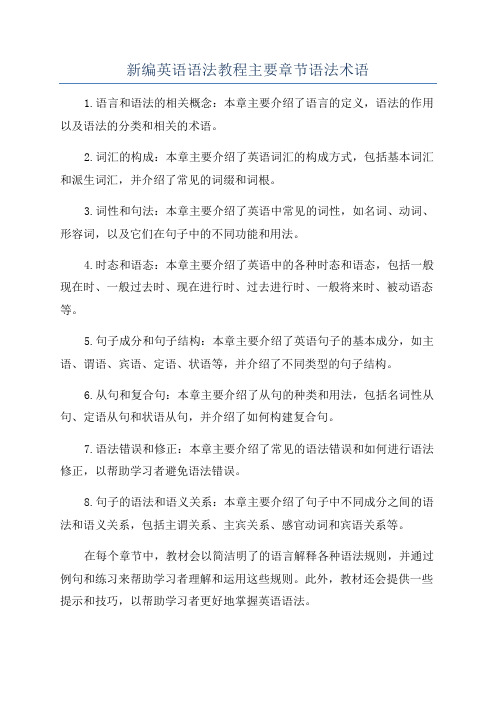
新编英语语法教程主要章节语法术语
1.语言和语法的相关概念:本章主要介绍了语言的定义,语法的作用以及语法的分类和相关的术语。
2.词汇的构成:本章主要介绍了英语词汇的构成方式,包括基本词汇和派生词汇,并介绍了常见的词缀和词根。
3.词性和句法:本章主要介绍了英语中常见的词性,如名词、动词、形容词,以及它们在句子中的不同功能和用法。
4.时态和语态:本章主要介绍了英语中的各种时态和语态,包括一般现在时、一般过去时、现在进行时、过去进行时、一般将来时、被动语态等。
5.句子成分和句子结构:本章主要介绍了英语句子的基本成分,如主语、谓语、宾语、定语、状语等,并介绍了不同类型的句子结构。
6.从句和复合句:本章主要介绍了从句的种类和用法,包括名词性从句、定语从句和状语从句,并介绍了如何构建复合句。
7.语法错误和修正:本章主要介绍了常见的语法错误和如何进行语法修正,以帮助学习者避免语法错误。
8.句子的语法和语义关系:本章主要介绍了句子中不同成分之间的语法和语义关系,包括主谓关系、主宾关系、感官动词和宾语关系等。
在每个章节中,教材会以简洁明了的语言解释各种语法规则,并通过例句和练习来帮助学习者理解和运用这些规则。
此外,教材还会提供一些提示和技巧,以帮助学习者更好地掌握英语语法。
通过学习新编英语语法教程,学习者可以系统地了解和掌握英语语法知识,提高英语写作和口语表达的准确性和流利度。
新编英语语法教程PPT课件

a word or phrase that describes or limits the meaning of another word in a sense
Sense and voice
Sense
indicates when an action or state occurs (past, present, or future)
Introduce clauses that modify nouns or pronouns (e.g., "who," "which," "that")
Used to ask questions about nouns or pronouns (e.g., "who," "what," "which")
Voice
indicates which subject of the presence performs the action (active voice) or receives the action (passive voice)
Subjunctive mood
Subjunctive mood
03 Nouns and Pronouns
Types and Usage of Nouns
Generic names for people, places, or things (e.g., "dog,"
"city")
Co mm on No uns
Refer to ideas, concepts, or qualities
Background
《新编英语语法教程》主要章节语法术语

《新编英语语法教程》主要章节语法术语第一章:基本语法概念本章主要介绍了英语语法的基本概念,如句子、名词、动词、形容词、副词等。
学习者可以通过本章了解英语基本语法结构和用法。
第二章:句子成分本章讲解了句子的主要成分,如主语、谓语、宾语、定语、状语等。
学习者可以通过本章学会如何分析句子的成分,理解句子的结构。
第三章:时态与语态本章详细解释了英语中的各种时态和语态,如一般现在时、一般过去时、现在进行时、被动语态等。
学习者可以通过本章掌握不同时态和语态的用法。
第四章:句子类型本章探讨了英语中的各种句子类型,如陈述句、疑问句、祈使句、感叹句等。
学习者可以通过本章学会如何构造和使用不同类型的句子。
第五章:从句与主从复合句本章介绍了从句的概念及其分类,如名词性从句、定语从句、状语从句等。
学习者可以通过本章了解从句的结构和用法,以及如何构造主从复合句。
第六章:非谓语动词本章讲解了非谓语动词的种类和用法,如不定式、动名词、分词等。
学习者可以通过本章学会使用非谓语动词来丰富自己的表达方式。
第七章:语法辨析与干扰本章列举了一些常见的语法错误和干扰问题,如时态混淆、主谓一致、被动语态与进行时的区别等。
学习者可以通过本章学会避免这些常见错误。
第八章:语法综合运用本章提供了一些综合性的语法习题,帮助学习者巩固和应用所学的语法知识。
通过完成这些习题,学习者可以提高语法分析和应用能力。
以上是《新编英语语法教程》主要章节和一些重要的语法术语的介绍。
这本书的内容较为全面,适合英语学习者系统学习和掌握英语语法知识。
《新编英语教程》1-2册语法点
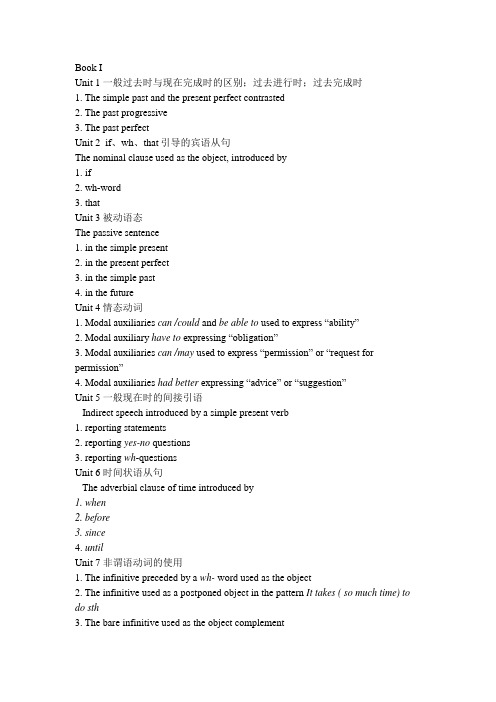
Book IUnit 1 一般过去时与现在完成时的区别;过去进行时;过去完成时1. The simple past and the present perfect contrasted2. The past progressive3. The past perfectUnit 2 if、wh、that引导的宾语从句The nominal clause used as the object, introduced by1. if2. wh-word3. thatUnit 3 被动语态The passive sentence1. in the simple present2. in the present perfect3. in the simple past4. in the futureUnit 4 情态动词1. Modal auxiliaries can /could and be able to used to express “ability”2. Modal auxiliary have to expressing “obligation”3. Modal auxiliaries can /may used to express “permission” or “request for permission”4. Modal auxiliaries had better expressing “advice” or “suggestion”Unit 5 一般现在时的间接引语Indirect speech introduced by a simple present verb1. reporting statements2. reporting yes-no questions3. reporting wh-questionsUnit 6 时间状语从句The adverbial clause of time introduced by1.when2.before3.since4. untilUnit 7 非谓语动词的使用1. The infinitive preceded by a wh- word used as the object2. The infinitive used as a postponed object in the pattern It takes ( so much time) to do sth3. The bare infinitive used as the object complement4. The –ing participle used as the object in pattern Would you mind…Unit 8 关系分句1. The relative clause introduced by that(as the subject)2. The relative clause introduced by that (as the object of a verb)3. The relative clause introduced by who,whomUnit 9 真实条件句与非真实条件句1. Sentences of real conditions2. Sentences of unreal conditions related to the present with be /have /action verbs in the conditional clauseUnit 10将来进行时,将来完成时与将来完成进行时1. The future progressive2. The future perfect3. The future perfect progressive.Unit 11 名词性从句Master the use of English nominal clauses and review indirect speechUnit 12 被动语态Master the use of passive voiceUnit 13 情态动词Modal auxiliaries: may/might, should/ought to, would rather, must/can‟tUnit 14 间接引语Indirect speech introduced by1. a simple present verb reporting past events2. a simple past verb reporting questions and answers3. a simple past verb reporting a conversationUnit 15 状语从句(地点,条件,原因,让步)The adverbial clause1. of place introduced by where2. of condition introduced by unless3. of cause introduced by because/ since4. of concession introduced by thoughUnit 16 现在分词1. –ing participle used as the object2. –ing participle preceded by go3. –ing participle used as the subject4. –ing participle used as the object of a preposition5. –ing participle used as a noun modifier6. –ing participle used as the object complement7. The infinitive preceded by in order expressing …purposeUnit 17 whose,whom引导的关系分句1. The relative clause introduced by whose.2. The relative clause introduced by w hom (as the object of a preposition)3. The cleft sentence with attention focused on various sentence elements.4. The relative clause preceded by a noun which is modified by a superlative. Unit 18 非真实条件句1. Sentences of unreal conditions making a supposition about the future2. Sentences of unreal conditions with past non-facts and present imaginary consequences3. Sentences of unreal conditions with past non-facts and past imaginary consequencesBook IIUnit 1 现在完成进行时,过去进行时与过去完成进行时Unit 2 名词性从句Unit 3 被动语态Unit 4 情态动词Unit 5 间接引语Unit 6 状语从句(目的,结果,让步)Unit 7 非谓语动词Unit 8 关系分句(关系副词)Unit 9 虚拟语气Unit 10 将来时间表示法Unit 11 it 引导的名词性从句Unit 12 被动语态Unit 13 情态动词Unit 14 间接引语Unit 15 状语从句Unit 16 非谓语动词Unit 17 关系分句(介词+关系代词)Unit 18 非真实条件句。
外教社新编英语语法教程(第6版)PPT课件Unit 30

[4] I didn’t take Tom to swim in the ̌ pool today. (= I took Tom to swim at the seaside, not in the pool.)
提示 最后一个例句,it用在由名词转化来的动词后面作形式宾语只见于 非正式语体。
重难点解析
30.1 IT-句型
30.2 否定结构
3 典型错误
①* You’ll find helpful to talk things over with a friend. ②* I’ll not give you any trouble if I can help that.
提示3
It’s no use doing ...句型可与几个类似句型进行转换,比如: It’s no use buying books but not reading them. = It is of no use to buy books but not to read them. = It is useless to buy books but not to read them. = There is no use / no good / no point buying books but not reading them.
'poetry. (= I didn’t buy the book, because it had nothing to do with
提示1 提示2
该结构中的动词通常是表心理状态的动词,如think,find,feel, believe,consider,make等。
新编英语语法教程1-18讲参考答案---上外第五版

《新编英语语法教程》1-18讲参考答案新编英语语法教程第01讲练习参考答案Ex. 1A1. A. his home workB. quickly, to play2. A. The huge black horseB. the race3. A. have thought aboutB. going into space4. A. warms up and crawlsB. out of the bag5. A. one of the most beautiful planets to look at through a telescopeB. because of the many rings that surround it6. A. 165 yearsB. to complete its path, or orbit,around the sun7. A. you and your brotherB. How many pairs of shorts8. A. the most expensive meal listed on the menuB. What9. A. an “Outdoor Code”B. their members10. A. can blowB. as fast as 180 miles (290 kilometers) an hour11. A. The spiral of heated air and moist airB. to twist and grow and spin12. A. The direction a hu rricane’s spiral movesB. counterclockwise13. A. does not shineB. At the north pole: for half of the year14. A. The cold winds that blow off of the Arctic OceanB. a very cold place15. A. might have beenB. guilty of murderEx. 1B1. SVCWithin the stricken area, not a single soul remained alive, and the city centre looked as if it had been razed by monster steam-roller.2. SVThe bomb exploded 1,000 ft. above the groun.3. SVOOn August 6, 1945, an American aircraft dropped a bomb on the Janpanese town of Hiroshima.4. SvoOThree days later, yet another bomb of the same kind gave the town of Nagasaki the same fatal blow.5. SVOCThe explosion made one and a half square miles of the city an expense of reddish rubble.6. SV AWithin the fraction of a second, the bomb changed from a metal cylinder into an immense mass of enpanding gas, millions of degrees hot.7. SVOAA tremendous blast of hot air whirled the debris of stone, cencrete, metal, and wood over the ground. Ex. 1C1. Walden Pond, once praised by Thoreau for its natural beauty, is now the site of many tourist stands.2. Almost every summer night the cooling northeast wind swept through our bedroom windows, marking air conditioning unnecessary and a light blanket welcome. / Swepping through our bedroom windows almost every summer night, the cooling northeast wind made…3. The steep surrounding slopes were capped with snow, which fed two streams plunging down to join in the valley below.4. With the river on one side and a large tree providing shade, this is a good spot for a picnic, and we can spread our blanket on the grassy knoll.5. Panting for breath after running up the stairs, Mr wood stood at his neighbour’s doo r and knocked again and again till someone opened it.6. The town folk envied horace, who had come into a small fortune with which he bought a big house and obtained a partnership in the biggest grocery in town.7. Standing in front of the mirror, Jim looked at his image, wondering at the big change that had come over him in recent years.8. The idea that his only daughter whom he had greatly wronged might never forgive him almost drove hime mad.9. The story, written in plain language, consists of three parts with an interesting plot centering round an aristocratic family living in 17th century France.10. Mud-covered and shivering, John sat hunched over a bowl of hot broth prepared by his father to drive off the chill.11. Far above the waters of a beautiful lake and over the tops of the tall pime trees growing on the steep ofa hill stand five Chinese-style pavilions.12. Farther down the street, the old man stopped and leaned against a lamp-post, listening to a cheerful song coming out of a restaurant on the oppsite side of the street.13. Sarah sank in the nearest chair, completely exhausted, her limbs stiff with cold, her mind a piece of blank.14. Throughout the day Mrs Rymer behaved very properly, her pleasant, refined face wearing a grave look, her elegant figure wrapped in deep mourning while occasionally she uttered a sigh or a sob.15. Tony thought it necessary to break the news to his family, that Mr Jacob, his former employer, had promised him a half-day job at 20 pounds a week. 16. The thought that he might have wronged his friend who had rendered him good services on many occasions troubled his mind, already overburdened with worries and cares.17. The men of the disbanded royal bodyguard, suddenly turned loose onto the street of a capital seething with unrest, unemployed and perhaps disgruntled at their abrupt dismissal, were a potentially dangerous element.18. For many years London has been a business centre with hotel accommadation for visiting businessmen toghter with well-to-do travellers but completely inadequate for the swarms of shour-stay tourists landing at Heathrow or disembarking at Dover.19. Nearing the top, he climbed recklessly faser and faster, his eyes already glowing with triumph, but suddenly he slipped and fell, tumbling to the ground and lying motionless there, a crumpled pile of arms and legs.20. Bertrand Russell was one of the very few persons who have received both the Order of Merit, which was conferred on him by the British government in 1949, and the Nobel Prize for literature, conferred in Norway in 1950.新编英语语法教程第02讲练习参考答案Ex. 2A1. come2. are3. has / have4. are5. are6. are7. was / were8. is9. costs 10. were 11. are 12. are 13. was 14. are 15. lie 16. were 17. are 18. is 19. is 20. was 21. Has 22. were 23. is 24. is 25. are 26. is 27. are 28. cover, are 29. is / are 30. was/wereEx. 2B1. were2. have3. is, is4. was5. were6. is7. is8. are9. is 10. are, are11. have 12. are, their, their 13. was, It, was 14, It / They, is / are 15. are, their, they, disapprove 16. were, they 17. was 18. are 19. were 20. were新编英语语法教程第03讲练习参考答案Ex. 3A1. is2. was3. is4. has5. were6. means7. is8. is9. is 10. is 11. were 12. sells 13. is 14. are 15. are 16. are 17. is 18. is 19. was 20.provides 21. are 22. was 23. stops 24. is 25. is 26. does 27. produces 28. is 29. is 30. was Ex. 3B1. ’s2. are3. is4. are5. is6. was7. is8. were9. is 10. ’s 11. is 12. is, is, is 13. are 14. is 15. have 16. is 17. are 18. looks 19. are 20. are 21. understand 22. has 23. was 24. have 25. was 26. was 27. are 28. is 29. is 30. was 31. is 32. is / are 33. leaves 34. is / are 35. are 36. are 37. is 38. comes 39. is 40. live 41. are 42. points / point 43. are 44. is 45. are 46. was 47. is / are 48. is 49. has 50. wasEx. 3C1. is / are2. is / are3. is4. is / are5. is / are6. remain7. is8. are9. has / have 10.care / cares 11. is 12. plays 13. is 14. am 15. are / is 16. was 17. is, has 18. was 19. come 20. is新编英语语法教程第04讲练习参考答案Ex. 4A1. description2. arrangement3. attendance4. peculiarity5. expectation6. argument7. dependence 8. originality 9. exaggeration10. measurement 11. purity 12. persistence 13. extension 14. statement 15. generosity 16. entrance 17. loneliness18. forgetfulness 19. happiness 20. seriousness Ex. 4B1. strange sounds2. foods are3. chief, tribes, their, salmon (s)4. The runners-up were given pound notes / The runners-up were each given a pound note.5. bodies, their heroes6. mice, tooth-marks7. Crises, occur, families8. / 9. / 10. these businesses 11. / 12. fruits are13. / 14. these articles are well written 15. / 16. several personal kindnesses17. / 18. sufferings 19. professors 20. children are playing, sandsEx. 4C1. experience2. waters3. for advice4. an important piece of information5. for it is fun6. were not numerous7. Poultry8. directors are9. militia 10. geniuses 11. merchandise has 12. sympathies 13. experiences 14. were times, rivalry 15. clippings, were 16. lookers-on 17. foliage is 18. photos 19. 12-pages 20. Luggage isEx. 4D1. blade2. piece3. choir4. flash5. lump6. gang7. grain8. head9. staff 10. collection 11. fleet 12. cluster 13. bundle 14. bunch 15. team 16. piece 17. ear 18. bar 19. herd 20. pack 21. flock 22. crowd / swarm 23. troupe 24. bench 25. grove 26. collection 27. suite 28. squadron 29. band 30. libraryEx. 4E1-5 BCADC 6-10 CBDAB 11-15 ADBBC 16-20 BDCAB新编英语语法教程第05讲练习参考答案Ex. 5A1. my father has a car2. the bull has horns3. the prisoner escaped4. her parents consented5. somebody released the prisoner6. somebody assassinated the President7. a letter from the general / the general sent a letter8. the crowd felt sympathy9. a college for women10. a summer day, a day in the summer11. the earth has a (rough) surface12. the absence lasted ten days13. a doctoral degree, a doctorate14. the bird made the nest15. the committee made a report16. a story told by the girl / the girl told a story17. the volcano erupted18. the victim had courage / the victim was courageous19. somebody punished the boy20. the critics recevied the play in a hostile manner Ex. 5B1. The comedian performed, and he was well received by a huge audience.这位喜剧演员的演出很受广大观众的欢迎。
新编语法教程全解析

新编语法教程全解析语法是语言的基础,它决定了我们能够如何表达和沟通。
为了帮助学习者更好地掌握语法知识,新编语法教程应运而生。
本文将对新编语法教程进行全面解析,从不同角度深入剖析其中的要点和窍门。
第一章:词类在语法中,词类是最基本的概念之一。
它将词语按照其功能和意义的不同划分为不同的类别。
新编语法教程全面介绍了名词、动词、形容词、副词、介词、冠词、连词和代词等八个基本词类。
通过掌握每个词类的特点和用法,学习者能够更准确地理解和运用英语语法。
第二章:句子结构语法教程的第二章主要讲解句子的基本结构。
在英语中,句子的构成离不开主语、谓语、宾语和补语等要素。
通过学习新编语法教程,我们可以了解各种句子结构的组成要素,如简单句、复合句和复杂句等。
同时,教程还提供了丰富的例子和练习,帮助学习者更好地理解和运用不同句子结构。
第三章:时态和语态时态和语态是语法中的重要概念。
新编语法教程详细介绍了英语中常见的时态和语态,如一般现在时、过去进行时、现在完成时和被动语态等。
通过学习时态和语态的用法和变化规则,学习者能够更准确地表达自己的思想和观点。
第四章:名词性从句名词性从句在英语语法中占有重要地位。
新编语法教程对名词性从句的定义、特点和分类等进行了详细解析。
通过学习名词性从句,学习者能够运用它们来构建复杂的句子结构,并增强句子的表达能力。
第五章:形容词从句和副词从句形容词从句和副词从句在语法中起着修饰和状语的作用。
新编语法教程全面介绍了形容词从句和副词从句的用法和结构。
通过学习形容词从句和副词从句,学习者能够更加灵活地表达自己的观点和思想。
第六章:倒装句倒装句是英语语法中常见的句子结构之一。
新编语法教程详细解析了倒装句的定义、分类和用法。
通过学习倒装句,学习者能够在写作和口语表达中更好地运用倒装结构,增强语言的表现力。
第七章:虚拟语气虚拟语气是英语语法中的难点之一。
新编语法教程提供了详细的虚拟语气用法和练习,帮助学习者更好地理解和掌握虚拟语气的用法和构造。
外教社新编英语语法教程(第6版)PPT课件Unit 22

重难点解析
22.0 -ing分词 22.1-ing分词与 22.2 既能直接带不定式又 22.3 -ing 的形式及用法 动词的搭配关系 能直接带-ing分词的动词 分词分句
They plan to plant the area with grass and trees.
重难点解析
22.0 -ing分词 22.1-ing分词与 22.2 既能直接带不定式又 22.3 -ing 的形式及用法 动词的搭配关系 能直接带-ing分词的动词 分词分句
2 能带不定式和-ing分词而意义不同的动词
e.g. We’re considering buying a new car. He denied having been there. We appreciate your inviting us to your party. She can’t stand being kept waiting.
1. remember / forget / regret等动词 + -ing分词:先于主句动词的动作 + 不定式:后于主句动词的动作
e.g. I remember posting the letter. (“寄信”先于“记得”) I remembered to post the letter. (“寄信”后于“记得”)
提示 would like意思是wish或want,后面永远接不定式,如“What would you like to do tomorrow?”。
《新编英语语法教程》主要章节语法术语
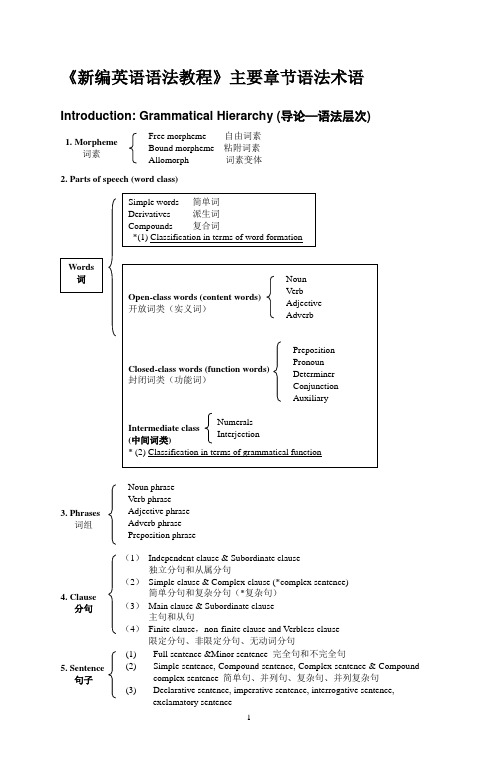
《新编英语语法教程》主要章节语法术语Introduction: Grammatical Hierarchy (导论—语法层次)2. Parts of speech (word class)3. Phrases词组4. Clause分句5. Sentence句子1. Morpheme词素Free morpheme 自由词素Bound morpheme 粘附词素Allomorph 词素变体Noun phraseVerb phraseAdjective phraseAdverb phrasePreposition phraseConjunctionLecture 1 Sentence Structure(L1)Sentence elements:S (subject) 主语V (predicate verb)谓语动词O (object)宾语C (complement)补足语A (Adverbial)状语1. Two ways of sentence analysis1) SVOSentenceClauseNP VP NPSubject Predicate verb ObjectAll the man have done their best.Sentence = Subject + Predicate (Predicate Verb + Object, Complement, Adverbial, etc.)●句子由主语和谓语构成,进一步把谓语剖析为谓语动词、宾语、补语、状语等。
2) Subject + Predicate (= operator + predication)SentenceClauseSubject PredicateOperator PredicationAll the man have done their best.●句子由主语和谓语构成,进一步把谓语剖析为操作词(operator)和述谓成分(predication)。
《新编英语语法教程》PPT课件

2021/6/20
1
Lecture 30 Coordination了
A coordinate construction is a sequence of semantically-related grammatical units that are similar in a form, equal in rank of
❖ One more boot, and I’ll have a pair.
❖ 如并列分句均为祈使句,第一句仍可表条件,第二句表结果:
❖ Surrender and live; resist and die. ❖ = If you surrender, you’ll live; … ❖ Don’t drink and drive. ❖ = If you don’t drink, you can drive. Or: ❖ If you drink, you can’t drive. 不许酒后开车。
❖ He is good and hungry. (very, extremely.)
❖ You’re all nice and hardworking.
2021/6/20
8
❖ And前的修饰后面的,表示程度,限于少数表性 质和程度的形容词和副词。最典型的是 nice and good.还有:
2021/6/20
16
❖ Or-group coordinators: or, either…or…
❖ 在否定句中,一般用 or 不用 and 连接同等成分。Or 一 般不表示所择关系:
❖ He has no money or food. ❖ = He has neither money nor food. ❖ I didn’t find him clever or good-looking. ❖ = I found him neither clever nor…. ❖ A sheep was not moving about or eating grass like the
《新编英语语法教程》_4-5讲ppt

c) Number forms of the abstract
单 数 式
大多数抽象名 பைடு நூலகம்onesty 词是不可数的 knowledge
少数是可数的 victory conference difficulty opinion
复 数 式
无
victories conferences difficulties opinions
3. for advice 5. for it is fun 8. directors are 11. merchandise has 14. were times, rivalry 17. foliage is 20. Luggage is
III. Partitives p. 49
“单位名词”表示事物个体性的词语,与单位词搭配表示“一群”、 “一帮”等意思,它们与不可数名词组合起来,便可以“计数”了。 “单位名词” 可分为: 1) General partitives p. 49 2) Partitives related to the shape of things 3) Partitives related to volume p. 50 p. 50 p. 50 p. 49
3. attendance 6. argument 9. exaggeration 12. persistence 15. generosity 18. forgetfulness
II. Number forms of nouns
1. Regular and irregular plural a) Regular plural (p.p. 42-44) b) Irregular plural (p.p. 44-45) 2. Number forms of the collective, material, abstract and proper noun a) Number forms of the collective (1)不能计数的集体名词:若要计数,须使用在语义上与之对应的 个体名词。例如: p. 46 集体名词 个体名词 poetry poem machinery machine clothing garment, coat, etc . . . . (2)可以计数的集体名词:有单、复数形式和单复数意义;将其视为 一个整体时,用作单数;强调构成集体的成员时,用作复数。 例如: p. 46 中页
新编英语语法教程第16讲
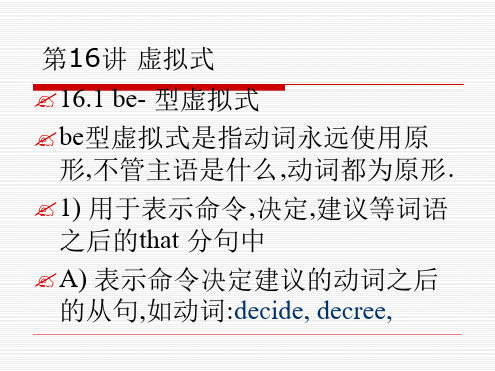
?He spoke to me as if I were deaf. ?He behaves as though he were better
than us. ?If only I were not so nervous.
? 12. 我一定要她在上海再多待一两天.
? A: I insisted that she stay in Shanghai for another day or two.
? 13. 钢铁工人要求提高工资百分之十.
? A: The steel workers demanded that their wages be increased by 10 per cent.
?whatever, lest ,so long as ?If the rumour be true, everything is
possible. ?Though everyone desert you, I will
not. ?Whatever be his defense, we cannot
tolerate this disloyalty.
?3) 用于某些公式化语句中 ?Long live the People's Republic of
China. ?God bless you! ?So be it. ?Suffice it to say that I know nothing. ?Far be it from me to call him a thief. ?I will stay here with you if need be.
?Suppose the earth were falt.
新编英语语法教程第-讲 ppt课件

wiped out in a few years.
4.听不到有什么声音。 A:There was no sound to be heard. 5. 我已经在这里呆了两天,没有什
么可看的了。
A:I’ve spent 2 days here. There is
say to any other person.
8.这是一个难以解答的问题。 A:This is a difficult question to answer.
9.听见窗外有脚步声,我便轻手轻 脚走出室外,但什么也没看见。
A:Awitntdhoewso, uI nsdtoolef
footsteps out of the
非谓语动词
• 非谓语动词 • 具有双重性质: • 1) 动词性质 • have breakfast fast • Having breakfast fast is bad for
health.
• 2) 非动词性质,即名词及形容词性 质
• To see is to believe. • The girl standing there is my sister.
• He expected to see him at once. • I can’t afford to buy a house now.
• 3)部分动词只用动名词作宾语 • acknowledge/ admit/ advise/
advocate/ allow/ anticipate/ appreciate/ avoid/ complete/ confess/ consider/ contemplate
• 非谓语动词作宾语 • 1) 不定式是 “未发生” 或 “将发生”
外教社新编英语语法教程(第6版)PPT课件Unit 21

“某些形容词+不定式结构” 作主语补语的歧义现象 P224
不定式 (二)
主—动关系、动—宾关系、 同位关系 P225
用主动态还是用被动态 P225
不定式与名词. 的搭配关系
“名词+不定式"与“名词+ 介词+ -ing分词” P226
不定式与动词 的搭配关系
动词+不定式 P228
动词+宾语+不定式 P228
主谓关系
He has a large family to support. (= that he must support) 动宾关系
He hit back the urge to tell a lie. (to tell a lie是the urge的具体内容) 同位关系
提示 表同位关系的名词中心词一般是由动词派生出来的抽象名词。
重难点解析
21.1 不定式与 21.2 不定式与 形容词的搭配 名词的搭配
21.3 不定式 与动词的搭配
21.4 不定式 分句
2. 表动宾关系时,如果不定式是不及物动词,其后需加适 当的介词
e.g. We are looking for a place to live in.
提示1 live为不及物动词,我们不能说to live a place,应该说to live in a place。
提示 动词为接双宾语的动词。
重难点解析
21.1 不定式与 21.2 不定式与 形容词的搭配 名词的搭配
21.3 不定式 与动词的搭配
21.4 不定式 分句
3 “名词 + 不定式”与“名词 + 介词 + -ing分词”
1. attempt, chance, effort, freedom, intention, necessity, opportunity, reason, time, way ...
- 1、下载文档前请自行甄别文档内容的完整性,平台不提供额外的编辑、内容补充、找答案等附加服务。
- 2、"仅部分预览"的文档,不可在线预览部分如存在完整性等问题,可反馈申请退款(可完整预览的文档不适用该条件!)。
- 3、如文档侵犯您的权益,请联系客服反馈,我们会尽快为您处理(人工客服工作时间:9:00-18:30)。
成
• I have a lot of work to do.
• 现在分词作定语,代表正进行或主 动
• a sleeping child
• 过去分词作定语,表已完成或被动
• the door unlocked
• 动名词作定语,常用来表示功能 • a sleeping child • a sleeping car
• defer/ delay/ deny/ detest/ endure/ enjoy/ escape/ evade/ excuse/ fancy/ forbid/ favor/ finish/ imagine/ include/ involve/ justify/ mention/ mind/ miss/ necessitate/ pardon/ permit/ postpone/ practice/ prevent/ quit/ recall/ renounce/ require/ resent/ resume/ risk/ stand/ suggest/ warrant/ can’t help
say to any other person.
8.这是一个难以解答的问题。 A:This is a difficult question to answer.
9.听见窗外有脚步声,我便轻手轻 脚走出室外,但什么也没看见。
A:Awitntdhoewso, uI nsdtoolef
footsteps out of the
Environmental pollution is a hard problem to be coped with.
2.时间紧迫,我们必须马上动身。 A:
There is no time to lose. We must start at once.
3.这是一种必须在几年之内加以消 灭的传染病。
• 两者作主语时的差异 • 1) 不定式强调结果,动名词强调过
程 • To see is to believe. • Seeing is believing.
• 2) 不定式侧重具体某次动作, 动名 词指抽象多次动作
• To smoke so much is not good for you.
• Smoking is not good for our health.
非谓语动词
• 非谓语动词 • 具有双重性质: • 1) 动词性质 • have breakfast fast • Having breakfast fast is bad for
health.
• 2) 非动词性质,即名词及形容词性 质
• To see is to believe. • The girl standing there is my sister.
• 3)在含有no, -less 等否定词的句子 中,一般都用动名词作真实主语.
• It is no use asking her advice.
• 4) 在某些名词或形容词后,用动名词 作真实主语.
• It’s a waste of time discussing such matters.
• It is worthwhile waiting for another 2 days.
nothing to see.
6.这是一本好书,有许多值得学习 的东西。
A:This is a good book in which there is
much to be learnt.
7.这是一则不可对任何人说的情报。
A:This is an item of information not to
• 非谓语动词的类型 • 1) 不定式 infinitive 具有名词及形
容词性
• 2) 动名词 gerund 具有名词词性 • 3) 现在分词 present participle • 具有形容词词性 • 4) 过去分词 past participle • 具有形容词词性
• 具有名词词性的非谓语动词,即不 定式,动名词,可作句子主语,宾语, 表语等
• I propose to stay there for a few days.(打算)
• try • They tried solving the problem in a
new way.(已经尝试)
• They tried to solve the problem in a new way.(试图准备)
outside the room, but
there was nothing to be seen.
10.他可是一个需要认真对待的人.
A: He is a man to be reckoned with. 11. 她坚决拒绝接受他的求婚。
A:She was firm in her refusal to accept
• When he was young, he went to Japan to study medicine.
• 2.时间和伴随状语一般用分词,不 定式不用作时间状语
• Hearing the news, they all jumped with joy.
• When leaving the airport, she waved again and again to us.
• 常见的动名词作定语的结构 • an opening speech
• drinking water • drawing paper • reading material • working method • walking stick • operating table
1.环境污染是一项难以应付的问题。 A:
• 6) there be句型的一种特殊情况 • There be no doing sth. = It is
impossible to do sth • There is no telling what would be
the punishment at the moment.
• 7) 表语和主语应平衡 • To live is to struggle. • Living is struggling.
• a waste of time/ an awful job/ not an easy work/ good / better/ interesting/ fun/ odd/ enjoyable/ worthwhile
• 5) 在某些名词或形容词后,用不定 式作真实主语
• It is very important to read aloud in learning a foreign language.
• consider / decide / explain / forget / know / tell / remember / wonder
• I have to consider where to go.
• Can you decide which county to invest to.
• 7) 动名词的复合结构,物主代词限 定动名词,如果不是所属关系,代词 用宾格和属格皆可
• 5) 主动表被动的动名词常用在下 列几个动词后
• require / need / want / deserve • Does your car require mending? • The flat is dirty. It needs cleaning.
• 6) 有些动词后可用疑问词带不定 式作宾语
• deserve / can’t bear • 有的意义略有差别 • I scorn telling lies.(抽象行为) • I scorn to tell a lie.(某次行为)
• 有的意义相差明显 • remember • I remember seeing her once somewhere.
A:This is an infectious disease to be
wiped out in a few years.
4.听不到有什么声音。 A:There was no sound to be heard. 5. 我已经在这里呆了两天,没有什
么可看的了。
A:I’ve spent 2 days here. There is
• Do you mind my making a suggestion?
• Pardon me saying it.
• She forgave him doing it.
• 三. 非谓语动词作状语 • 1.不定式通常作目的状语,分词一
般不作目的状语
• Many farmers left home to seek job in big cities.
• It is considerate of you to give me a hand.
• important/ easy/ hard/difficult/ nice
• clever/ foolish/ wrong/ considerate/ rude/ impolite/ pleasure/ mistake/ pity/ shame/ honor
• 3. 原因状语一般由Being… 和 Seeing Nhomakorabeahat…引导
• Being sick, I stayed at home. • Seeing that it was raining, he took
an umbrella. • Being written in haste, the
composition is full of mistakes.
• 非谓语动词作宾语 • 1) 不定式是 “未发生” 或 “将发生”
而动名词是 “已完成” • remember to turn off the light • remember turning off the light
